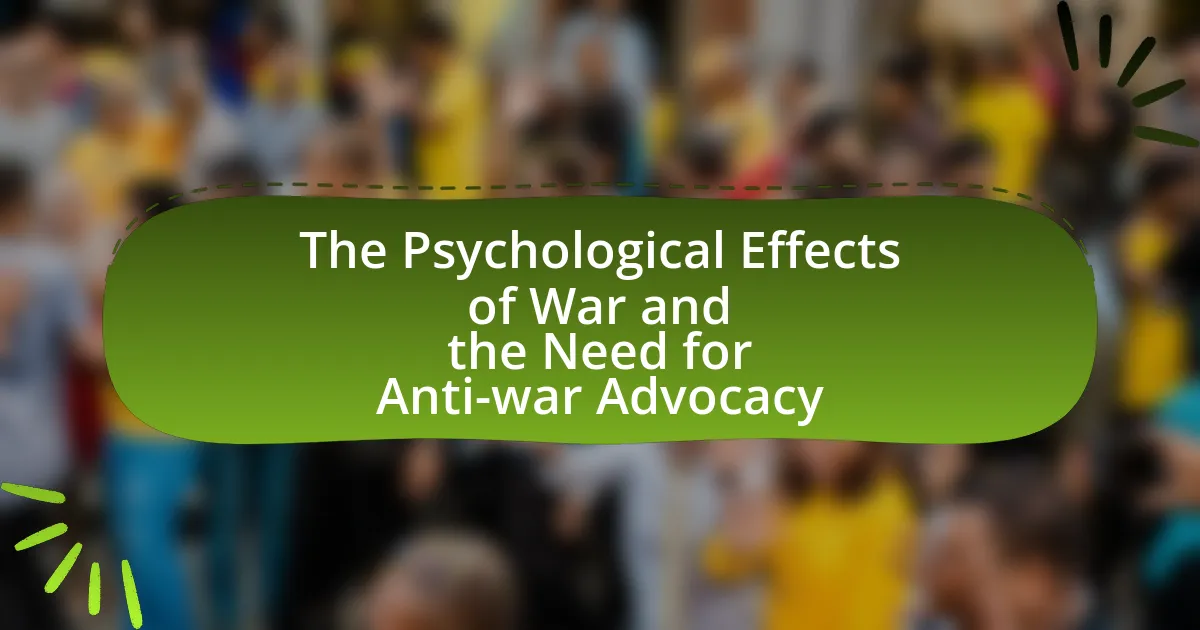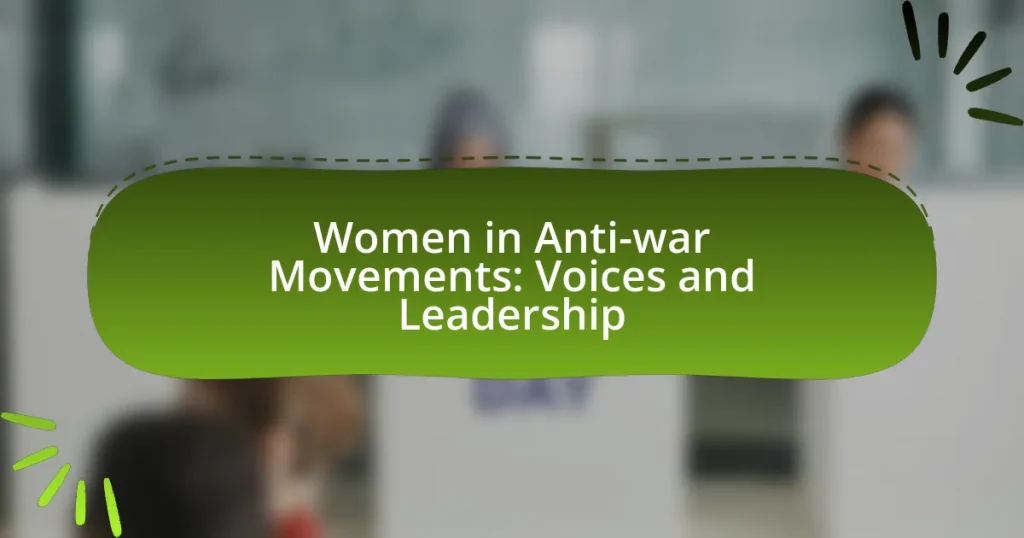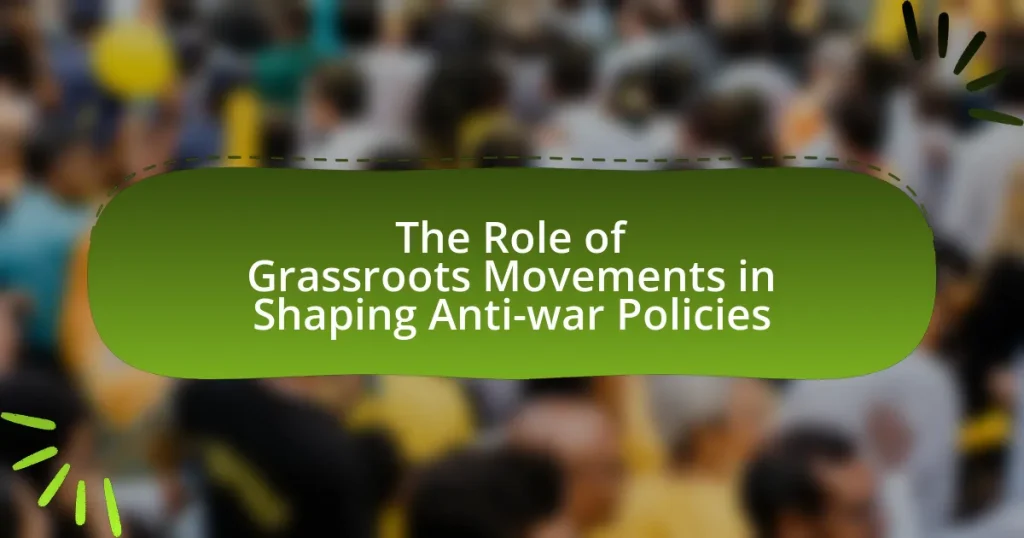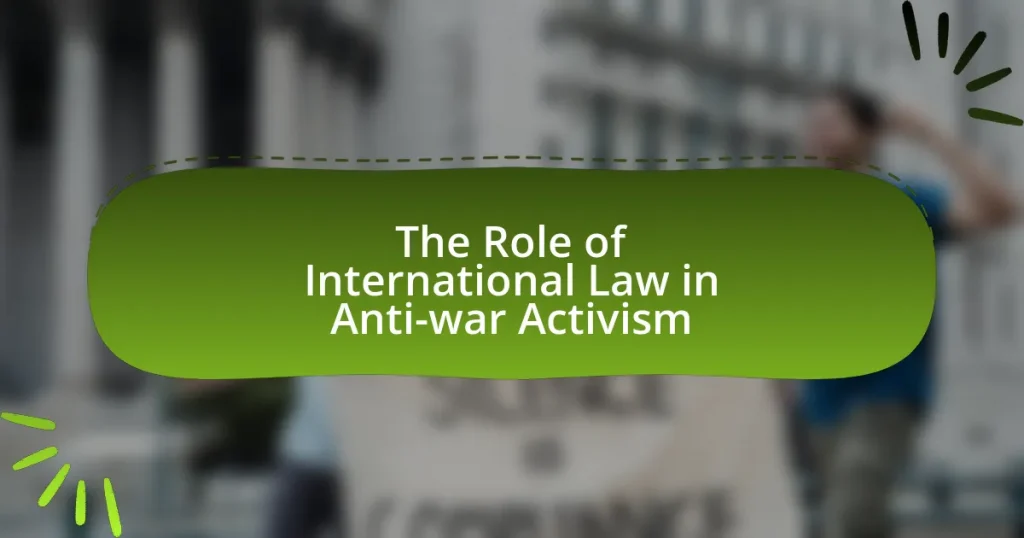The article examines the psychological effects of war, highlighting the prevalence of mental health issues such as post-traumatic stress disorder (PTSD), depression, and anxiety among both veterans and civilians. It discusses the individual and societal impacts of these disorders, emphasizing the need for effective mental health interventions and support systems. Additionally, the article underscores the role of anti-war advocacy in raising awareness about the mental health consequences of conflict and promoting peace, while detailing historical examples of how such movements have influenced public policy and military engagement. The connections between war, mental health, and advocacy are explored, illustrating the importance of understanding these effects to foster healing and prevent future conflicts.
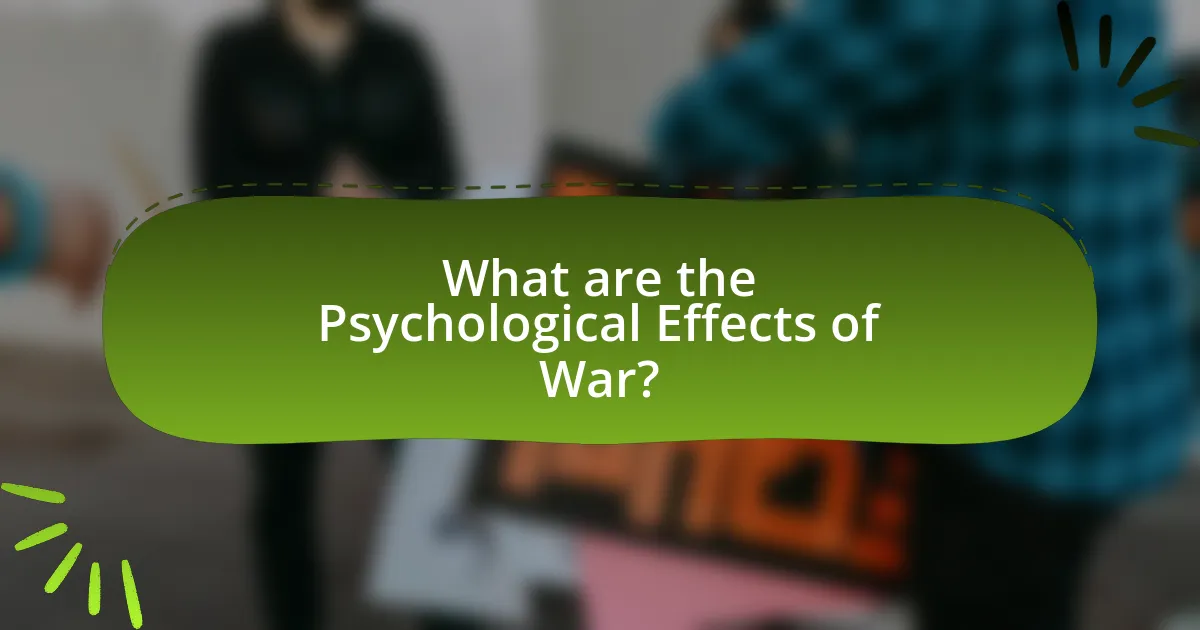
What are the Psychological Effects of War?
The psychological effects of war include post-traumatic stress disorder (PTSD), depression, anxiety, and other mental health issues. Research indicates that approximately 20% of veterans experience PTSD, which can lead to severe emotional distress and functional impairment. Additionally, civilians in war zones often suffer from anxiety and depression due to exposure to violence, loss, and displacement. A study published in the Journal of the American Medical Association found that children in conflict areas exhibit higher rates of psychological distress, including behavioral problems and emotional difficulties. These effects underscore the urgent need for anti-war advocacy to address the mental health crisis stemming from armed conflict.
How does war impact mental health on an individual level?
War significantly impacts mental health on an individual level by increasing the prevalence of psychological disorders such as post-traumatic stress disorder (PTSD), depression, and anxiety. Research indicates that combat veterans experience PTSD at rates as high as 30%, with symptoms including flashbacks, severe anxiety, and uncontrollable thoughts about the traumatic events they witnessed. Additionally, civilians in war zones often face similar mental health challenges due to exposure to violence, loss of loved ones, and displacement. A study published in the journal “The Lancet” found that individuals living in conflict-affected areas reported higher levels of psychological distress, highlighting the pervasive effects of war on mental well-being.
What specific mental health disorders are associated with war experiences?
Post-traumatic stress disorder (PTSD), depression, and anxiety disorders are specific mental health disorders commonly associated with war experiences. PTSD affects veterans and civilians exposed to traumatic events, with studies indicating that approximately 20% of veterans from recent conflicts experience this disorder. Depression often co-occurs with PTSD, impacting mood and functioning, while anxiety disorders, including generalized anxiety disorder and panic disorder, can arise from the stress of combat and its aftermath. Research has shown that these disorders can lead to significant impairment in daily life and relationships, underscoring the need for effective mental health interventions for those affected by war.
How do traumatic experiences during war affect long-term psychological well-being?
Traumatic experiences during war significantly impair long-term psychological well-being, often leading to conditions such as post-traumatic stress disorder (PTSD), depression, and anxiety. Research indicates that approximately 20% of veterans experience PTSD, which can persist for years after the conflict has ended. Additionally, studies show that exposure to combat and violence can alter brain function and structure, contributing to ongoing mental health issues. For instance, a study published in the Journal of the American Medical Association found that veterans exposed to traumatic events during war are at a higher risk for substance abuse and suicidal behavior, further underscoring the lasting impact of these experiences on psychological health.
What are the societal psychological effects of war?
The societal psychological effects of war include increased rates of trauma, anxiety, and depression among affected populations. War disrupts social structures, leading to a breakdown of community cohesion and support systems, which exacerbates mental health issues. Research indicates that post-traumatic stress disorder (PTSD) prevalence can rise significantly in populations exposed to conflict, with studies showing that up to 30% of veterans experience PTSD, while civilians in war zones may face similar or higher rates. Additionally, the stigma surrounding mental health in many cultures can prevent individuals from seeking help, further entrenching psychological distress. The long-term consequences can manifest in intergenerational trauma, affecting not only those directly involved in the conflict but also their descendants, thereby perpetuating cycles of violence and instability.
How does war influence community mental health?
War significantly deteriorates community mental health by increasing rates of trauma, anxiety, and depression among affected populations. Research indicates that exposure to violence and loss during conflict leads to long-term psychological distress, with studies showing that up to 30% of individuals in war-torn areas experience post-traumatic stress disorder (PTSD). Additionally, the breakdown of social structures and support systems during war exacerbates feelings of isolation and helplessness, further impacting mental well-being. For instance, a study published in the Journal of Traumatic Stress found that communities exposed to prolonged conflict exhibit higher incidences of mental health disorders compared to those in peaceful environments.
What role does collective trauma play in post-war societies?
Collective trauma significantly impacts post-war societies by shaping their social dynamics, mental health, and cultural narratives. This shared psychological distress can lead to widespread feelings of grief, anger, and mistrust among the population, which often hinders reconciliation and social cohesion. For instance, studies have shown that communities affected by war experience increased rates of PTSD, depression, and anxiety, which can persist for generations, as evidenced by the long-term psychological effects observed in regions like Bosnia and Herzegovina following the Yugoslav Wars. Furthermore, collective trauma can manifest in cultural expressions, influencing art, literature, and collective memory, thereby affecting how societies process their history and engage in future conflict prevention.
Why is understanding the psychological effects of war important?
Understanding the psychological effects of war is important because it directly impacts the mental health and well-being of individuals and communities affected by conflict. Research indicates that exposure to war can lead to conditions such as post-traumatic stress disorder (PTSD), depression, and anxiety, which can persist long after the conflict has ended. For instance, a study published in the Journal of the American Medical Association found that nearly 30% of veterans returning from Iraq and Afghanistan experienced PTSD, highlighting the long-term psychological consequences of war. Recognizing these effects is crucial for developing effective mental health interventions and support systems, ultimately aiding in the recovery and reintegration of affected populations.
How can awareness of these effects lead to better support systems?
Awareness of the psychological effects of war can lead to better support systems by informing policymakers and mental health professionals about the specific needs of affected populations. Understanding the trauma, anxiety, and depression that often result from war enables the development of targeted interventions and resources. For instance, studies have shown that veterans suffering from PTSD benefit significantly from tailored therapy programs, which can be implemented when there is a clear understanding of these psychological effects. Furthermore, increased awareness can foster community support initiatives, as seen in programs that provide peer support for individuals affected by war, thereby enhancing the overall effectiveness of mental health services.
What implications do these effects have for future conflict resolution?
The psychological effects of war significantly influence future conflict resolution by necessitating a focus on mental health and trauma recovery in post-conflict societies. Addressing the psychological scars left by war can lead to more effective reconciliation processes, as evidenced by studies showing that communities with robust mental health support systems experience lower rates of violence and conflict recurrence. For instance, the World Health Organization highlights that integrating mental health services into post-conflict recovery can enhance social cohesion and reduce the likelihood of renewed hostilities. Thus, prioritizing psychological healing is essential for sustainable peace and conflict resolution strategies.
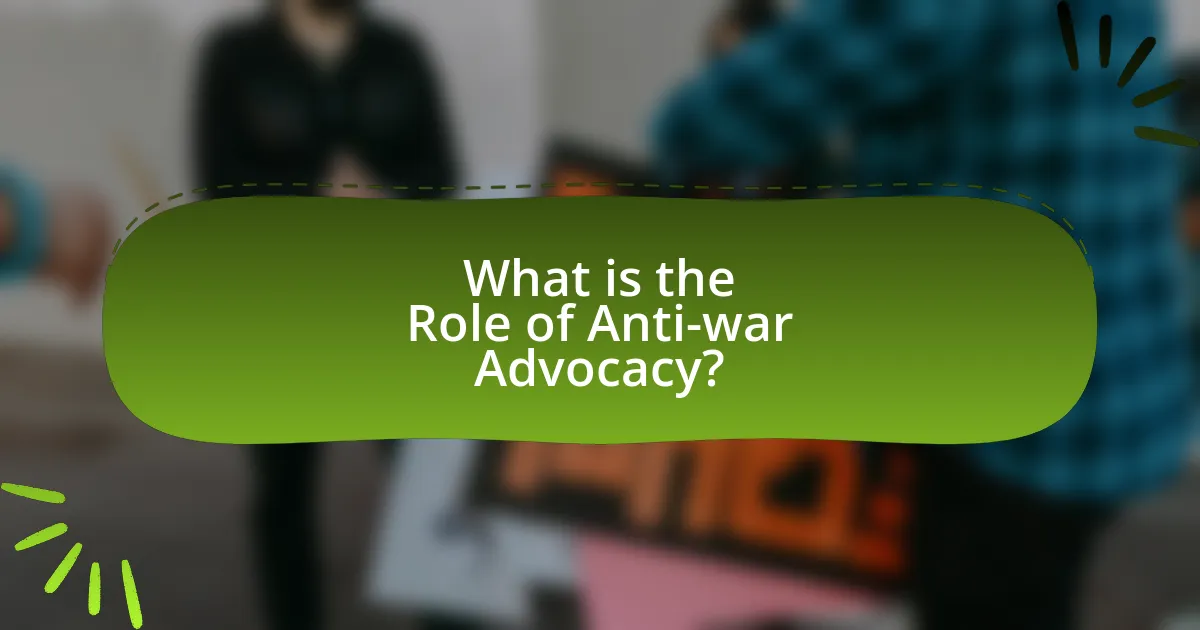
What is the Role of Anti-war Advocacy?
Anti-war advocacy plays a crucial role in promoting peace and preventing conflict by raising awareness about the psychological, social, and economic consequences of war. This advocacy seeks to mobilize public opinion against military actions, emphasizing the detrimental effects of war on mental health, such as PTSD and anxiety disorders, which affect both combatants and civilians. Historical evidence, such as the widespread anti-war movements during the Vietnam War, demonstrates that organized advocacy can influence government policies and public sentiment, ultimately leading to a reduction in military engagements.
How does anti-war advocacy address the psychological effects of war?
Anti-war advocacy addresses the psychological effects of war by promoting mental health awareness and providing support systems for affected individuals. Advocacy groups often highlight the trauma experienced by veterans and civilians, emphasizing the need for psychological care and resources. For instance, studies indicate that veterans are at a higher risk for PTSD, with the U.S. Department of Veterans Affairs reporting that approximately 11-20% of veterans who served in Iraq and Afghanistan experience PTSD in a given year. By raising awareness of these issues, anti-war advocates aim to influence policy changes that prioritize mental health services and funding for trauma recovery programs. This approach not only seeks to alleviate the psychological burden on individuals but also fosters a broader societal understanding of the mental health implications of war.
What strategies do anti-war advocates use to raise awareness about mental health issues?
Anti-war advocates utilize various strategies to raise awareness about mental health issues, including public campaigns, educational programs, and collaboration with mental health organizations. Public campaigns often involve social media outreach, where advocates share personal stories and statistics about the psychological impact of war, aiming to humanize the issue and foster empathy. Educational programs in schools and communities provide information on the mental health consequences of war, emphasizing the importance of support for affected individuals. Collaborating with mental health organizations allows advocates to leverage expertise and resources, creating comprehensive initiatives that address both the stigma surrounding mental health and the specific needs of veterans and civilians impacted by conflict. These strategies are supported by research indicating that increased awareness can lead to better mental health outcomes and reduced stigma, as highlighted in studies published by organizations like the American Psychological Association.
How can advocacy efforts contribute to healing in war-affected communities?
Advocacy efforts can significantly contribute to healing in war-affected communities by promoting mental health resources and facilitating dialogue among affected individuals. These efforts often lead to increased awareness of the psychological trauma experienced by individuals, which is crucial for recovery. For instance, organizations like the International Committee of the Red Cross have documented that access to mental health services can reduce symptoms of PTSD and depression in war survivors. Furthermore, advocacy can mobilize funding and support for community-based programs that provide counseling and social support, which are essential for rebuilding trust and social cohesion in these communities.
Why is anti-war advocacy crucial in contemporary society?
Anti-war advocacy is crucial in contemporary society because it seeks to prevent the psychological and social consequences of armed conflict. The impact of war extends beyond the battlefield, affecting mental health, community stability, and global relations. For instance, studies indicate that veterans and civilians exposed to war experience higher rates of PTSD, depression, and anxiety, which can lead to long-term societal issues. Furthermore, anti-war movements have historically contributed to policy changes, promoting diplomacy over military action, as seen in the Vietnam War protests that influenced U.S. foreign policy. Thus, anti-war advocacy plays a vital role in mitigating the adverse effects of war on individuals and societies.
What historical examples demonstrate the impact of anti-war movements?
Anti-war movements have significantly influenced public policy and military engagement, with notable historical examples including the Vietnam War protests and the opposition to the Iraq War. The Vietnam War protests, particularly in the late 1960s and early 1970s, mobilized millions of Americans, leading to a shift in public opinion that pressured the U.S. government to withdraw troops in 1973. This movement was marked by large demonstrations, such as the 1969 Moratorium to End the War in Vietnam, which drew over two million participants nationwide, showcasing the power of grassroots activism. Similarly, the anti-war movement against the Iraq War in the early 2000s galvanized widespread dissent, with the largest global protests occurring on February 15, 2003, where millions marched in cities worldwide. This opposition contributed to a growing skepticism about the war, influencing political discourse and leading to a shift in U.S. foreign policy. Both examples illustrate how organized anti-war movements can effectively challenge military actions and reshape national narratives.
How does anti-war advocacy influence public policy and military engagement?
Anti-war advocacy significantly influences public policy and military engagement by shaping public opinion and pressuring government officials to reconsider military actions. Advocacy groups, through protests, campaigns, and lobbying, mobilize citizens to express dissent against war, which can lead to decreased public support for military interventions. For instance, the Vietnam War era saw widespread anti-war protests that ultimately contributed to a shift in U.S. policy, leading to the withdrawal of troops. Additionally, studies indicate that public sentiment can directly impact legislative decisions; when a majority of citizens oppose military action, lawmakers are more likely to respond by altering or halting military engagements. This dynamic illustrates the power of anti-war advocacy in promoting diplomatic solutions over military ones, thereby influencing the trajectory of national and international policies.

What are the Connections Between War, Mental Health, and Advocacy?
War significantly impacts mental health, leading to conditions such as PTSD, depression, and anxiety among veterans and civilians. Research indicates that approximately 20% of veterans experience PTSD, highlighting the urgent need for mental health support and advocacy. Advocacy plays a crucial role in raising awareness about these mental health issues, promoting access to treatment, and influencing policy changes to support affected individuals. Organizations like the National Alliance on Mental Illness advocate for mental health resources, emphasizing the importance of addressing the psychological consequences of war. Thus, the connections between war, mental health, and advocacy are intertwined, as advocacy efforts aim to mitigate the mental health crises stemming from the effects of war.
How can understanding psychological effects inform anti-war advocacy?
Understanding psychological effects can significantly inform anti-war advocacy by highlighting the mental health consequences of war on individuals and communities. Research indicates that exposure to war leads to increased rates of PTSD, depression, and anxiety among combatants and civilians alike. For instance, a study published in the Journal of the American Medical Association found that nearly 20% of veterans returning from Iraq and Afghanistan experience PTSD, which underscores the long-term psychological toll of conflict. By emphasizing these effects, anti-war advocates can effectively argue that war not only causes immediate physical harm but also inflicts lasting psychological damage, thereby fostering a more compelling case for peace and conflict resolution strategies.
What evidence supports the link between mental health awareness and advocacy effectiveness?
Research indicates that increased mental health awareness significantly enhances advocacy effectiveness. For instance, a study published in the Journal of Mental Health found that campaigns promoting mental health awareness led to a 30% increase in public support for mental health initiatives. This correlation is further supported by data from the World Health Organization, which states that awareness campaigns can reduce stigma and encourage individuals to seek help, thereby increasing the effectiveness of advocacy efforts. Additionally, the National Alliance on Mental Illness reported that communities with higher mental health awareness saw improved legislative outcomes related to mental health funding and policy changes. These findings collectively demonstrate that mental health awareness directly contributes to the success of advocacy initiatives.
How can advocates tailor their messages to address psychological impacts?
Advocates can tailor their messages to address psychological impacts by using empathetic language and relatable narratives that resonate with the emotional experiences of affected individuals. This approach helps to create a connection between the audience and the subject matter, making the psychological effects of war more tangible. Research indicates that storytelling can significantly enhance emotional engagement, as evidenced by a study published in the journal “Psychological Science,” which found that narratives can evoke empathy and motivate action. By incorporating personal stories of those impacted by war, advocates can effectively highlight the psychological trauma and foster a deeper understanding of the need for anti-war advocacy.
What practical steps can individuals take to support anti-war advocacy?
Individuals can support anti-war advocacy by engaging in grassroots activism, such as participating in protests and rallies that promote peace. These actions raise awareness about the psychological and social impacts of war, as evidenced by studies showing that public demonstrations can influence policy decisions and public opinion. Additionally, individuals can educate themselves and others about the consequences of war through workshops, discussions, and sharing informative resources, which helps to foster a more informed community. Supporting organizations that focus on anti-war efforts, such as the American Friends Service Committee, can also amplify advocacy efforts, as these organizations often have established networks and resources to effect change. Finally, individuals can utilize social media platforms to spread anti-war messages, as research indicates that online activism can mobilize support and create a broader dialogue around the need for peace.
How can community involvement enhance the effectiveness of anti-war initiatives?
Community involvement can enhance the effectiveness of anti-war initiatives by fostering collective action and amplifying diverse voices against war. When communities actively participate, they create a unified front that can influence public opinion and policy decisions. For instance, grassroots movements, such as the Vietnam War protests in the 1960s, demonstrated how community mobilization can lead to significant political change, ultimately contributing to the cessation of military involvement. Additionally, studies show that community engagement increases awareness and understanding of the psychological impacts of war, leading to greater empathy and support for anti-war efforts. This collective awareness can drive more substantial advocacy and policy reform, making community involvement a crucial element in the success of anti-war initiatives.
What resources are available for those looking to engage in anti-war advocacy?
Various resources are available for individuals seeking to engage in anti-war advocacy, including organizations, literature, and online platforms. Prominent organizations such as the American Friends Service Committee and Veterans for Peace provide educational materials, networking opportunities, and advocacy training. Additionally, literature such as “War is a Force That Gives Us Meaning” by Chris Hedges offers critical insights into the impacts of war, while online platforms like social media groups and websites dedicated to peace activism facilitate community engagement and information sharing. These resources collectively empower advocates to effectively promote anti-war messages and mobilize public support.
